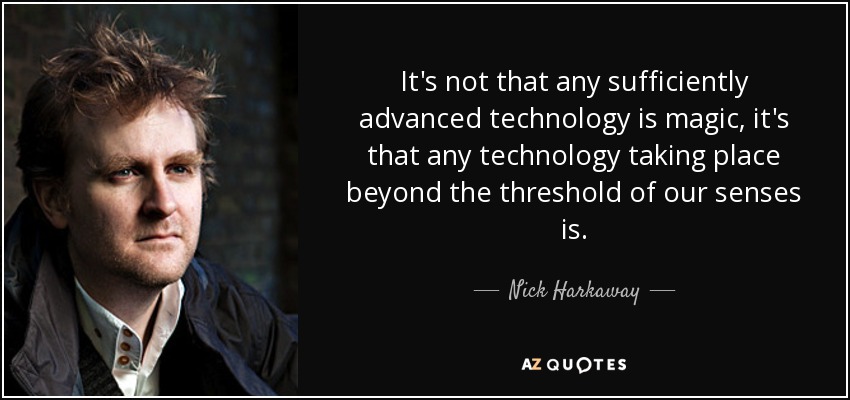Technology, when it's at its best, is like magic. Arthur Clarke famously said, "Any sufficiently advanced technology is indistinguishable from magic." I prefer the science fiction writer Nick Harkaway's version:

New technologies are often on the precipes of our senses and those who are less immersed in technology can sometimes be more enamored with that magic but I actually relish the times when technology amazes me.
Generative AI has that vibe at the moment. Being able to provide a good prompt or input and see instantly an improved output is quite satisfying. At this point, that's about all I can appreciate with certainty. You don't need to know much more than that to be aware of its dangers and potential for disruption in the worst ways. That said, I don't feel confident to argue too much on either end of the spectrum.
But I'll tell you 3 sources that I think bear the street cred to pay attention to at least in the education context.
1. Chris Dede
Chris Dede has spent a lifetime in this space. He is also willing to admit some hesitancy in knowing exactly how things will play out. He and fellow Harvard colleague Lydia Cao wrote a nice paper with advice for educators. They use a powerful analogy about how the brain and the mind are different and that AI is much like a brain without a mind. They also address the limitations of what AI can teach.
"Important skills and dispositions such as higher-order thinking, leadership, creativity, resilience, and open-mindedness cannot be taught explicitly. When we try to teach them, we often reduce them to a recipe and procedure that do not reflect the complexity of the real world (Dede, 2022). A Chinese idiom says 'Words transmit, actions teach (言传身教),' acknowledging the importance of both explicit teaching through words and implicit teaching through modeling and action."
The paper ends with 4 things educators can do:
- Demystify AI: Teach learners the nature of generative AI
- Focus on the process of learning rather than just the product
- Honor learner agency and orchestrate multiple sources of motivation
- Cultivate skills that AI cannot perform
2. Gary Stager
From that same generation, I also look to Gary Stager. Gary has been a long-time friend who has a proven track record with computing. If you're looking for someone to dance around the issue and work to stay politically correct, Gary may not be your man but if you want someone to speak from experience and an unwavering commitment to children, Gary is your guy. Gary has been talking about AI and mostly working to demystify it as well as focusing on what children can and should be doing with computers. There are lots of interviews and videos of Gary addressing the issue and here's one.
3. Dan Meyer
Finally, I've read the thought-provoking work of Dan Meyer. Dan has been a long-time part of my network and falls into the category of wicked smart. Dan has helped many math educators and educators at large think differently about math education and writes to provoke and share insights many of us miss. His take on the way education tries to adopt the current AI technologies speaks to the lack of consistent belief and understanding many have about the purpose of learning.
"If you are a technologist and do not have a concrete theory of learning, you are navigating the world of edtech without a compass and blaming the people you meet there for not appreciating the tools you brought with you.
If you are a teacher and do not have a concrete theory of learning, you will succumb too easily to a marketing campaign that is without precedent in my lifetime, a campaign designed to convince you that generative AI’s transformation of learning is inevitable, designed to convince you that these scraps falling from the table of commerce are, in fact, a multi-course meal. Your theory of learning will tell you whether or not they’re right.
My theory of learning tells me:
Don’t eat the scraps. Demand a meal."
So my journey is just beginning. It's been interesting talking with school leaders and hearing many different approaches, understandably so. This is something that requires each of us to partner with trusted leaders and thinkers, folks who have been around the block and time or two and have demonstrated a commitment to educators, students, and education as a whole. Who are you looking to to help guide your journey?